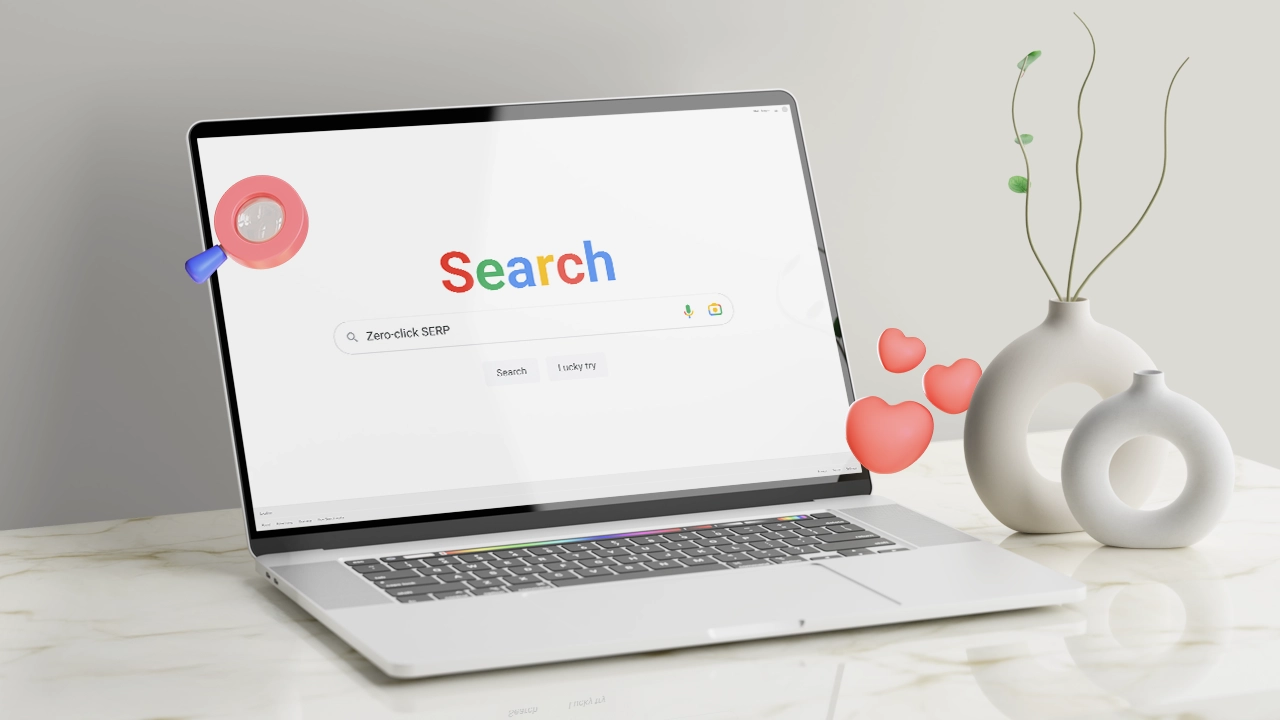More often, users find the answer directly on Google, without accessing any other websites. If you don’t adapt your content strategy, you risk losing visibility even if you are at the top of the results. The “zero-click” phenomenon is no longer an exception, but the new rule that shapes what we know about SEO.

Search Engine Results Page (SERP) represents the totality of pages that Google or other search engines, such as Bing, Yahoo, etc., display in response to user searches, and these are made up of either organic links, ads, images and/or videos. Essentially, a SERP is a list generated by search engines in response to a query. Typically, these searches focus on the results on the first page, and about 30% of clicks go to position 1.
Searches that do not generate clicks are those that produce direct answers on the search engine page, so users no longer need to access links. These results are usually obtained from simple queries, such as the exact time, weather updates, exchange rates, formulas, Google reviews, or direct questions, for example, “how old is Nicușor Dan”.
Types of Zero-click SERP
There are several types of results that do not generate clicks:
- Feature Snippet: information extracted from a web page that provides a direct, short and clear answer, displayed above organic results.
- Direct answer box: located at the top of the results and that does not contain any links. This type of SERP comes as a (simple) response to a (simple) question (weather updates, conversions, formulas and so on).
- AI Overview: combines information from multiple sources and transforms it into a unified and easy-to-read response.
- Knowledge Panel: a box of summarized text placed on the right side of the screen (on desktop) with summarized information about various topics that can include images, links, related news, similar topics and more.
- Local Pack: a feature that provides maps and lists of businesses available in certain areas that match user searches.
- People Also Asked (PAA): a list of frequently asked questions in accordion style (click on question - answer expands downwards).
- Carousel stories: a series of stories and/or news relevant to the searched topic.
How do You Adapt?
Due to the multiple types of SERP that provide instant answers and the way Google operates (promoting Google products), click on links is declining. Additionally, this decline is also attributed to user behaviors, as they get their information from social media, AI chats, YouTube videos, online stores and so on.
The clearest thing is that we cannot stop Google from promoting zero-click results, but we can adapt.
How? There are a Few Ways:
- SEO Strategies
You can identify keywords, phrases and questions that trigger types of SERP, thus optimizing the type of results you can achieve, not volume. - Local SEO Optimization
With local SEO improvements you can appear in local packs, knowledge panels, feature snippet, local packs. - Content Structure and Optimization
For this it is indicated that the content size to be smaller, have heading and subheadings and lists, for easier navigation through information. - E-E-A-T Content (Expertise, Experience, Authoritativeness, Trustworthiness)
Increase your legitimacy (introduce yourself, work with specialists), create clear content, update regularly, cite reliable sources, present different viewpoints, prioritize reviews. - Schema Markup
A type of code that can help search engines understand, structure and create a summary with the information from a page, providing visibility.
Good or Bad?
Zero-click SERP is a double-edged sword: it can offer valuable exposure (if you manage to get into the snippets displayed directly in SERP). Users see your name directly on the results page, which gives you authority and trust.
But this lack of interaction can be frustrating and problematic, especially if the success of your business is measured in traffic, conversions, and time spent on the website. It is like a chess game, where intelligent and strategic moves bring you victory: write clear and quick content, scan-friendly but also intriguing, providing reasons for users to enter and return to you later.
In June 2025, some changes and updated took place (which Google has not yet officially confirmed but has been documented by SEO specialists) that directly influenced organic, mobile and local searches. Thus, declines in website traffic were reported even though positions in the results lists remained the same.
The emphasis was on quick information delivery and user experience in the SERP, with Google becoming increasingly efficient in providing zero-click results, meaning that speed, clarity and content structure are becoming increasingly important.
Core Web Vitals and Their Impact on Zero-click SERP
The set of Core Web Vitals metrics is becoming increasingly influential in ranking results and in the way content is selected for direct display in SERP.
What are these metrics?
- Largest Contentful Paint (LCP) - measures how quickly the main element loads.
- Interaction to Next Paint (INP) - analyzes how quickly the user can interact.
- Cumulative Layout Shift (CLS) - evaluates how stable the layout is during loading.
How do these metrics relate to zero-click SERP and you? If your page loads slowly, has unstable elements and/or is hard to access from mobile, then the chances of appearing in the SERP decrease significantly, regardless of how good your content is.
The definition of visibility has changed, and the winner is no longer the one who has just the correct information, but the one who delivers it faster, clearer and in a format that Google can use instantly. For this, you need a better content structure, clear strategies, quality content, and flawless technical experience on the page.
This holistic approach (content + UX + speed) is what specialists teams apply in various projects for clients who want visible and sustainable results.
Similar Articles
Want to chat more about this topic or any other topic?
Book a meeting with one of our digital monsters!